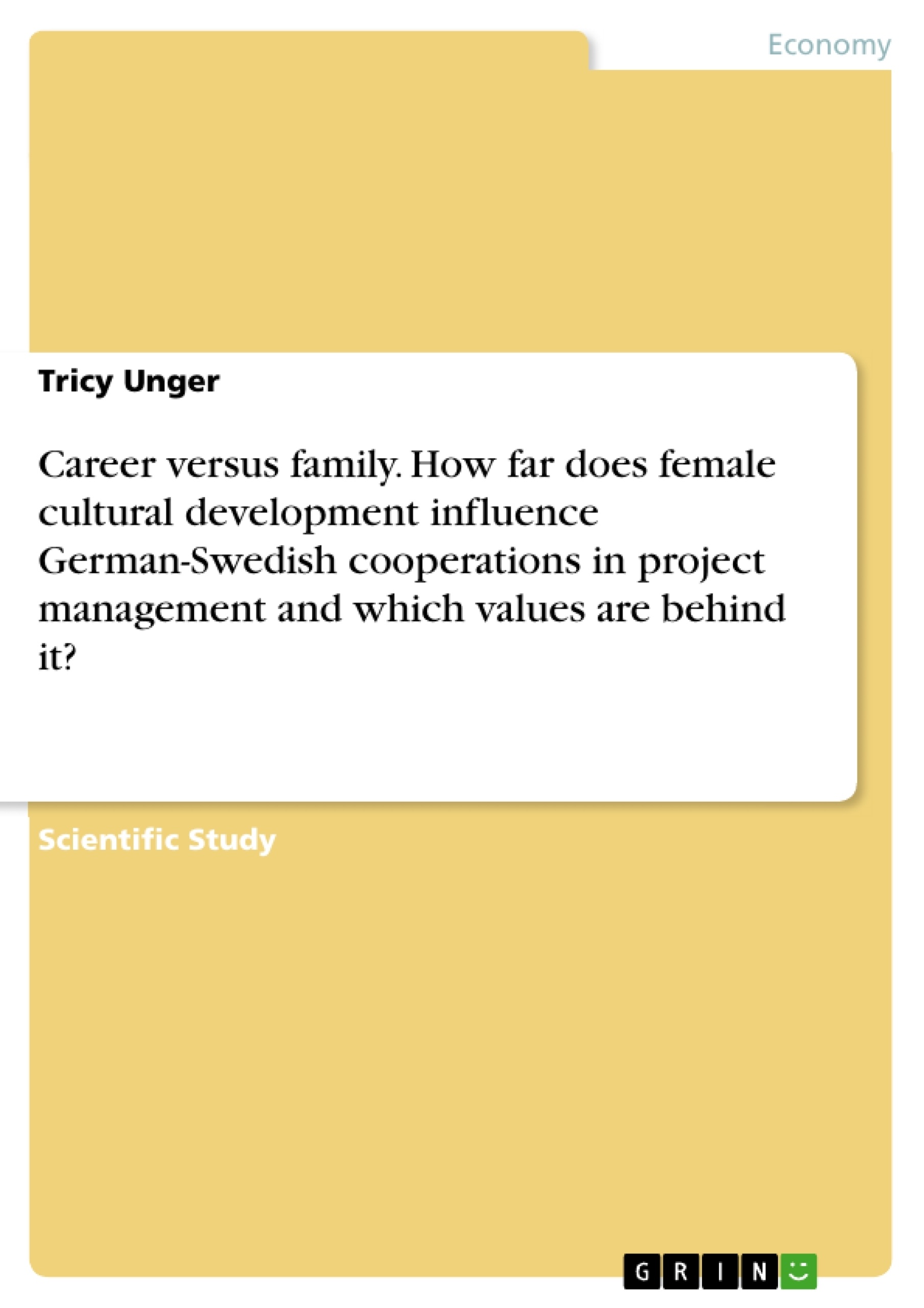Paper deals with research question “How far female cultural development in-fluences German-Swedish cooperation in project management and which values are behind it?”. Collaboration in international teams is stamped by different cultures and therefore varying values. A guarantee of success and efficiency is only possible if those disparities are considered. Teamwork of groups who consists of women from Germany and Sweden appear at first in cultural view as similar. On closer inspection variation due to history of women in each country are available. Comparison based on dimensions of culture from Geert Hofstede. German women are influenced by their past. Traditional role orientation and allocation of household as well as childcare are deep in mind indeed there is a sea change in last decades. For that reason German are embossed by values like performance and hierarchy. On contrary in Sweden gender equality is deep-seated since foundation. Development of public frame conditions promoted this in family as well as business and enabled a work-life-balance for women. Hence values like self-independence and equality are momentous. Outcome of diverse values are potentials and consequences in teamwork.
Inhaltsverzeichnis (Table of Contents)
- Introduction
- General information
- Intercultural project management
- Hofstede: Models and dimensions of culture
- Country reports
- Germany
- Sweden
- Development of women
- Germany
- Situation before 1945
- Point of departure 1945
- West Germany
- East Germany
- Today
- Sweden
- Germany
- German-Swedish project management
- In general
- Commonalty and disparity
- Potentiality and negative consequences
Zielsetzung und Themenschwerpunkte (Objectives and Key Themes)
This paper aims to investigate the influence of female cultural development on German-Swedish cooperation in project management, specifically exploring the underlying values shaping this collaboration. The research focuses on the differences in cultural perspectives and their potential impact on team dynamics.
- The influence of cultural development on German-Swedish project management
- The role of values in intercultural teamwork
- The impact of historical and societal factors on gender roles and attitudes towards work-life balance
- The potential benefits and challenges of diverse team compositions
- The application of Hofstede's cultural dimensions framework to analyze German-Swedish collaboration.
Zusammenfassung der Kapitel (Chapter Summaries)
The first chapter introduces the research question and provides the context for the investigation. It draws upon personal experiences to highlight the contrasting approaches to family and career values in Sweden and Germany. The second chapter delves into the concepts of intercultural project management and cultural differences, drawing on established literature to define key terms and frameworks.
Chapter three focuses on providing country reports, highlighting the historical and contemporary social contexts of Germany and Sweden. It explores the specific cultural nuances and societal expectations that influence women's roles in both countries. The fourth chapter then deepens the analysis by focusing on the development of women in both countries, emphasizing the historical trajectory of gender roles and the evolution of women's participation in the workforce.
Chapter five explores the intersection of German and Swedish cultures within project management, analyzing the commonalities and disparities in values and attitudes. It examines the potential for collaboration and the challenges posed by cultural differences.
Schlüsselwörter (Keywords)
The research focuses on the interplay of internationality, project management, teamwork, cultural dimensions, values, gender equality, work-life balance, self-independence, role orientation, and childcare.
Frequently Asked Questions
How do cultural values influence German-Swedish project management?
Collaboration is shaped by different historical developments. While German culture often emphasizes hierarchy and performance, Swedish culture is deeply rooted in equality and self-independence.
What is the difference in gender roles between Germany and Sweden?
In Sweden, gender equality has been promoted by public conditions for decades, enabling a better work-life balance. In Germany, traditional role orientations regarding childcare are still more present despite recent changes.
How does Hofstede's framework apply to this study?
The research uses Geert Hofstede's cultural dimensions to compare German and Swedish values, highlighting disparities in power distance and femininity/masculinity.
What are the potential consequences of these cultural differences in teams?
Differences can lead to negative consequences if ignored, but they also offer potential for higher efficiency and success if diversity is managed correctly.
How did the development of women in East and West Germany differ?
The paper examines the point of departure in 1945, showing how different societal systems in East and West Germany influenced women's participation in the workforce and their values today.
- Citation du texte
- Tricy Unger (Auteur), 2015, Career versus family. How far does female cultural development influence German-Swedish cooperations in project management and which values are behind it?, Munich, GRIN Verlag, https://www.grin.com/document/354846



